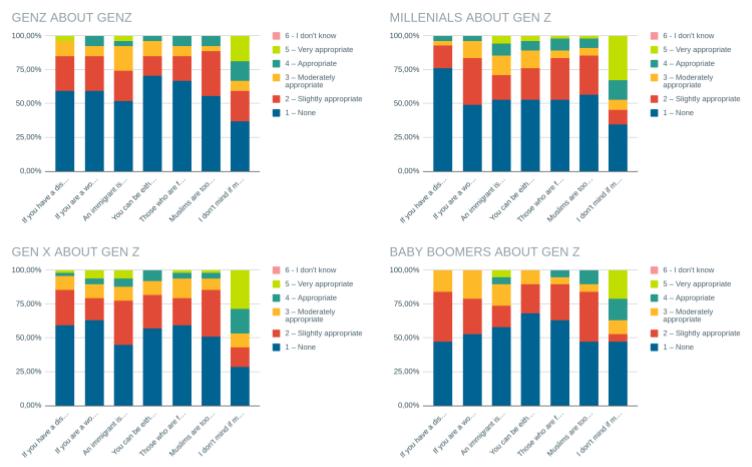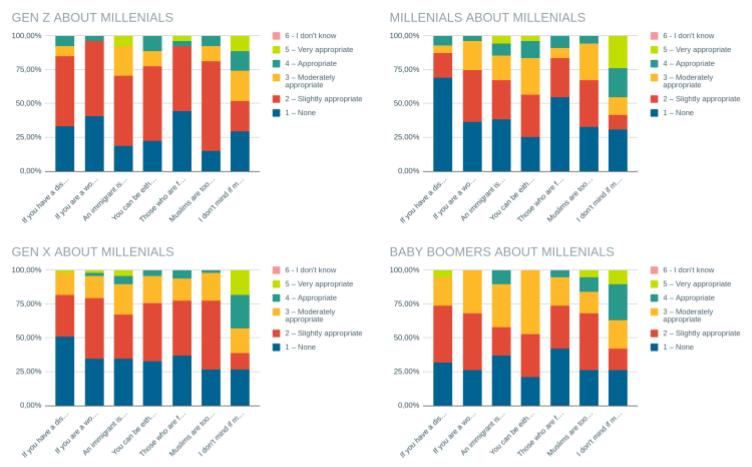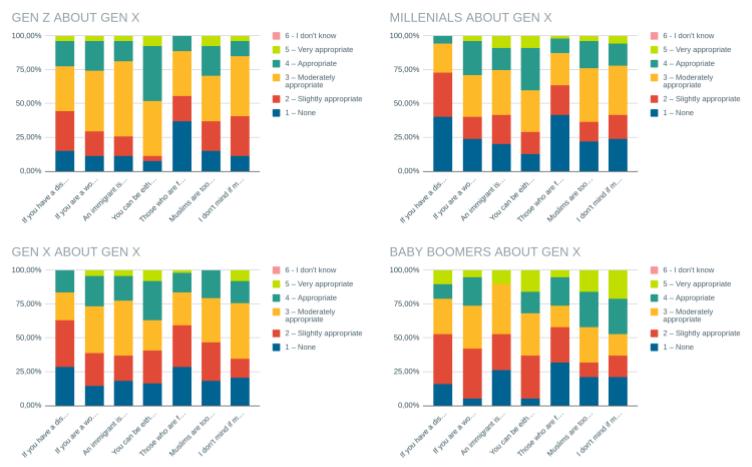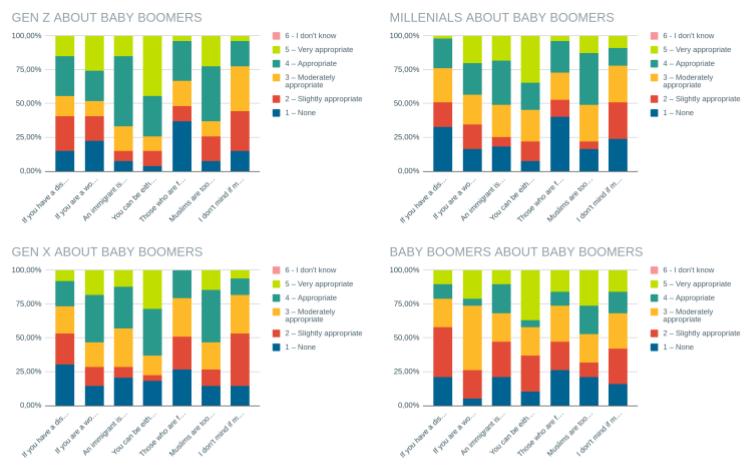42. Intersectional discrimination factors differ between generations, as they depend on historical context, social norms and professional roles. Based on your experience which generation is more likely to vocalise the following views? Enter values between 1 and 5 (1- none and 5- very appropriate)

This question investigates generational perceptions regarding various forms of intersectional discrimination—that is, how prejudices and stereotypes related to disability, gender, origin, gender identity, weight, religion, and sexual orientation are expressed or vocalized by different generations. Respondents are asked to rate, from 1 (not at all appropriate) to 5 (very appropriate), how likely each generation is to express certain stereotypical or discriminatory opinions, considering historical context, social norms, and professional roles.
The statements under investigation are:
- If you have a disability your work is not genuine
- If you are a woman, you have to prioritise appearance, then motherhood, and only then can you hope to have a career if you have not left it too late
- An immigrant is not entitled to the same opportunities as someone born here
- You can be either male or female, there are no other possibilities
- Those who are fat are not trustworthy, they can’t even control themselves
- Muslims are too different from us, no use trying to understand them
- I don’t mind if my colleague is gay if he does his job properly
These statements represent various stereotypes and prejudices related to disability, gender, ethnic origin, gender identity, weight, religion, and sexual orientation. Respondents evaluated how appropriate it is that each generation expresses these views.
The vocalization of discriminatory views varies significantly by generation, highlighting a clear gradient from the more conservative and stereotypical attitudes of Baby Boomers to the strongly inclusive and critical stance toward prejudice seen among Generation Z and Millennials. This underscores how historical and social contexts shape the perception and expression of intersectional discrimination within workplaces and society.
The mutual perceptions and self-perceptions of the generations highlight a clear cultural divide: younger generations (Gen Z, Millennials) show more inclusiveness and self-criticism towards prejudices, whereas older generations (Gen X, Baby Boomers) maintain more stereotypical views, influenced by historical and social contexts. This reflects a significant generational dynamism in representations of intersectional discrimination.
Generation Z
Perception by other generations:
- Millennials, Gen X and Baby Boomers perceive Gen Z as the least likely to express discriminatory and stereotypical views.
- Gen Z is seen as strongly inclusive, especially on issues of sexual orientation, gender identity and disability.
- Discriminatory statements towards disability, gender, origin and religion are rated as very inappropriately attributed to this generation.
Self-perception of Gen Z:
- Gen Z also self-rated with very low scores of appropriate/very appropriate to express stereotypes and prejudices, confirming their external perception.
- They therefore see themselves as a generation that is sensitive and critical of discrimination, rejecting traditional stereotypes.

Millennials
Perception by other generations:
- Gen Z and Baby Boomers see Millennials as moderately likely to express stereotypes, with some responses still influenced by more traditional norms (e.g. the role of women).
- Gen X sees them as fairly open, but with some reservations about immigrants and gender identity.
Self-perception of Millennials:
- They tend to consider themselves fairly inclusive, with low appropriateness ratings for discriminatory statements, but somewhat more tolerant than Gen Z especially on gender roles.
- In summary, Millennials see themselves as “in transition”, between tradition and progressive openness.

Generation X
Perception by other generations:
- Gen Z and Millennials perceive Gen X as more traditionalist, with a greater propensity to express stereotypes, especially regarding gender roles and immigration.
- Baby Boomers perceive Gen X as less rigid than them but still closer to traditional views.
Self-perception of Gen X:
- Gen X self-assess themselves with average scores of appropriate/very appropriate on some discriminatory statements, especially related to women’s roles, immigrants and cultural stereotypes.
- They recognise themselves as somewhere in between, neither completely traditional nor completely modern.

Baby Boomers
Perception by other generations:
- All generations agree that Baby Boomers are more likely to express stereotypical and discriminatory views related to traditional gender roles, immigration and gender identity.
- They are seen as the least inclusive generation and most tied to historical social norms.
Self-perception of Baby Boomers:
- They self-assess themselves with higher appropriateness scores in expressing these stereotypical statements than other generations.
- These data indicate a lower awareness or less critical attitude towards intersectional prejudice and discrimination.
This post is also available in: German Italian Polish Portuguese (Portugal)







